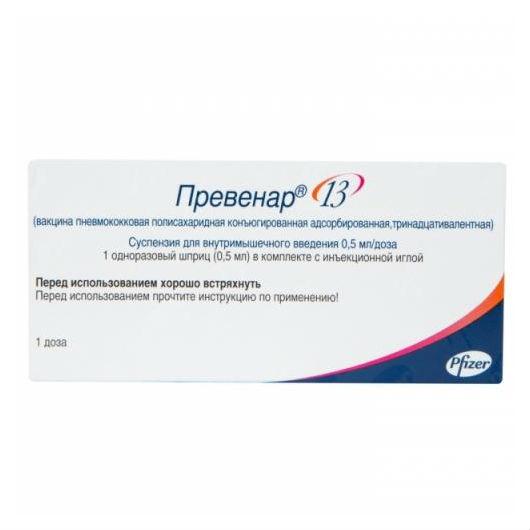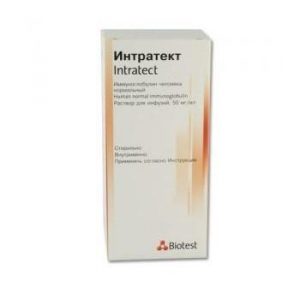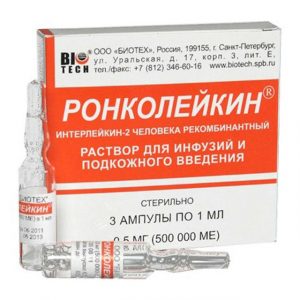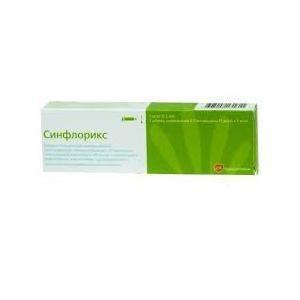Description
Release form
Suppression for intramuscular administration
Packaging
Syringe 0.5 ml.
Pharmacological action of
Introduction of the vaccine Prevenar 13 causes the production of antibodies to Streptococcus pneumoniae capsular polysaccharides, thereby providing specific protection against infections caused by the 1,3,4, 5, 6A, 6B, 7F, 9V, 14,18C included in the vaccine. 19A, 19F and 23F with pneumococcal serotypes.
According to the WHO recommendations for new conjugated anti-pneumococcal vaccines, the equivalence of the immune response was evaluated using the Prevenar 13 and Prevenar vaccines based on a combination of three independent criteria: percentage of patients who reached the concentration of specific IgG antibodies 0.35 μg / ml geometric mean concentrations of immunoglobulins (IgG GMC) and opsonophagocytic activity of bactericidal antibodies (OFA titer 1: 8). Introduction Prevenar 13 causes the development of an immune response to all 13 vaccine serotypes, equivalent to the Prevenar vaccine according to the above criteria.
The Prevenar 13 vaccine includes up to 90% of all serotypes that cause invasive pneumococcal infections (IPI), including those that are resistant to antibiotic treatment. Observations in the United States since the introduction of the 7-valent Conjugate Conjugate vaccine Prevenar suggest that the most severe cases of invasive pneumonia are associated with serotypes included in Prevenar 13 (1, 3, 7F and 19A), in particular, serotype 3 is directly related with necrotizing pneumonia disease.
Immune response when using three or two doses in the
primary vaccination series After administering three doses of Prevenar 13, primary vaccination of children under 6 months showed a significant increase in the level of antibodies to all vaccine serotypes. After the introduction of two doses during the primary vaccination, Prevenar 13, as part of mass immunization of children of the same age group, a significant increase in antibody titers to all components of the vaccine was also noted, but an IgG level of 0.35 μg / ml for serotypes 6B and 23F was determined in a smaller percentage of children. At the same time, the concentration of antibodies after the introduction of a booster dose of Prevenar 13 compared with the concentration of antibodies before the introduction of a booster dose increased for all 13 serotypes. The formation of immunological memory is indicated for both of the above vaccination regimens. The secondary immune response to the booster dose in children of the second year of life when using three or two doses in a series of primary vaccinations is comparable for all 13 serotypes.
Prevenar 13 contains seven serotypes common with the Prevenar vaccine and the CRM197 carrier protein. The comparative identity of both vaccines in immunogenicity and safety profile allows you to switch from Prevenar to Prevenar 13 at any stage of vaccination of the child, and an additional 6 serotypes in Prevenar 13 provide broader protection against IPI.
Indications
Prevention of diseases caused by Streptococcus pneumoniae serotypes 1, 3, 4, 5, 6A, 6B 7F, 9V, 14, 18C, 19A, 19F and 23F (including bacteremia, sepsis, meningitis, pneumonia and acute otitis media) in children aged 2 months to 5 years.
Contraindications
Hypersensitivity with previous administration of Prevenar, hypersensitivity to excipients and / or diphtheria toxoid acute infectious and non-infectious diseases, exacerbation of chronic diseases (in these cases, vaccination is carried out after recovery or in remission).
Special instructions
Given the rare cases of anaphylactic reactions, the child after vaccination should be under medical supervision for at least 30 minutes. Immunization sites should be provided with anti-shock therapy. When deciding whether to vaccinate a child with a severe degree of prematurity (pregnancy 28 weeks), especially with a history of immaturity of the respiratory system, it should be borne in mind that the benefits of immunization against pneumococcal infection in this group of patients are especially high and neither vaccination should be refused or transferred. deadlines. However, due to the potential risk of apnea (present with the use of any other vaccines), the first vaccination of Prevenar 13 should be carried out in a hospital under medical supervision (at least 48 hours).
Like other intramuscular injections, for children with thrombocytopenia and / or others, disorders of the blood coagulation system and / or in the case of treatment with anticoagulants, vaccination with Prevenar 13 should be carried out with caution, subject to stabilization of the condition of the child and achievement of hemostasis control.
Prevenar 13 provides protection only against those serotypes of Streptococcus pneumoniae that are part of it, and does not protect against other microorganisms that cause invasive diseases, pneumonia or otitis media. In children with impaired immune activity, vaccination may be accompanied by a reduced level of antibody formation.
There is limited evidence that the Prevenar 13 precursor, the seven-valent Prevenar vaccine, elicits an adequate immune response in children under 6 months of age with sickle cell anemia, and their Prevenar safety profile is similar to that of vaccinated non-high risk. Currently, there is no data on the safety and immunogenicity of the vaccine in children of other high-risk groups for invasive pneumococcal infections (for example, in children with congenital or acquired spleen dysfunctions, HIV infection, malignant tumors, and nephrotic syndrome). The decision to vaccinate children from high-risk groups should be made individually. Relevant data for the Prevenar 13 vaccine are currently not available.
High-risk children under 2 years of age should receive primary vaccination with Prevenar 13 according to age. In cases where children aged 2 years and older who are at high risk (for example, with sickle cell anemia, asplenia, HIV infection, chronic disease or immunological dysfunction) and previously received Prevenar 13 vaccination courses, a 23-valent pneumococcal polysaccharide vaccine has been prescribed, the interval between vaccines should be at least 8 weeks.
Due to the fact that the cause of the development of otitis media can be a variety of pathogens (viruses, bacteria, fungi, mixed infections), and not just pneumococci of the 13 types included in Prevenar, the estimated preventive effectiveness of Prevenar 13 against otitis may be less pronounced compared to efficacy for invasive diseases.
Due to a higher risk of developing febrile reactions in children with convulsive disorders, including a history of febrile seizures, as well as those receiving Prevenar 13 simultaneously with whole-cell pertussis vaccines, prophylactic antipyretic drugs are recommended.
Composition
1 dose (0.5 ml) contains pneumococcal conjugates (polysaccharide + CRM197), serotype 1 polysaccharide – 2.2 Ñg, serotype 3 polysaccharide – 2.2 Ñg, serotype 4 polysaccharide – 2.2 Ñg, serotype polysaccharide 5 – serotype 6 – serotype 5 2.2 mcg polysaccharide of serotype 6B – 4.4 Ñg, polysaccharide of serotype 7F – 2.2 Ñg, polysaccharide of serotype 9V – 2.2 Ñg, polysaccharide of serotype 14 – 2.2 Ñg, serotype 18C oligosaccharide – 2.2 Ñg, polysaccharide of serotype 19A – 2.2 Ñg, polysaccharide – serotype serotype 23F – 2.2 Ñg, carrier protein CRM197 ~ 32 Ñg
Dosage and administration
Dosage and administration:
The vaccine is administered intramuscularly into the anterolateral thigh (children under 2 years old) or the deltoid muscle of the shoulder (children over 2 years old), in a single dose of 0.5 ml. Before use, the syringe with the Prevenar 13 vaccine must be shaken well until a homogeneous suspension is obtained. Do not use if foreign particles are detected during inspection of the contents of the syringe or the contents look different than in the Description section of this manual.
Do not administer Prevenar 13 intravenously!
Vaccination schedule
Age from 2 to 6 months:
Series of three primary vaccinations: 3 doses of Prevenar 13 are administered at least 1 month apart. The first dose can be administered to children from the age of 2 months. Revaccination is carried out once in 11-15 months. The scheme is used in the implementation of individual immunization of children against pneumococcal infection.
Series of double primary vaccination: 2 doses of Prevenar 13 are administered with an interval between administrations of at least 2 months. The first dose can be administered to children from the age of 2 months. Revaccination is carried out once in 11-15 months. The scheme is used in the mass immunization of children against pneumococcal infection.
For children for whom vaccination was not started in the first 6 months of life, the administration of Prevenar 13 is carried out according to the following schemes:
Age from 7 to 11 months: two doses with an interval between administrations of at least 1 month. Revaccination is carried out once in the second year of life.
Age 12-23 months: two doses with an interval between administrations of at least 2 months.
Age 2 to 5 years (inclusive): once
If vaccination has been started with Prevenar 13, it is recommended that you also complete it with the Prevenar 13 vaccine.
If you need to increase the interval between injections of any of the above vaccination courses, additional doses of Prevenar 13 are not required.
Children previously vaccinated with Prevenar
Vaccination against pneumococcal infection started with the 7-valent Prevenar vaccine can be continued with Prevenar 13 at any stage of the immunization schedule.
Side effects
Safety Prevenar has been studied in healthy children aged 6 weeks to 18 months. In all cases, Prevenar was used simultaneously with other recommended childhood vaccines. The most common adverse reactions were pain at the injection site and fever (fever).
During revaccination, the most frequent cases of rapidly passing pain at the injection site (36.5%), as well as cases of short-term limitation of the range of limb movements due to pain at the injection site (18.5%).
Older children who received the vaccine once had a higher rate of local reactions than children under 1.5 years of age, but these reactions were short-lived.
Drug Interactions
Interchangeability data Prevenar and Prevenar 13 for non-CPM197-based pneumococcal conjugate vaccines are not available.
Prevenar 13 is combined with any other vaccines in the immunization calendar for infants. Prevenar 13 can be administered to children at the same time (on the same day) with any of the following antigens that are part of both monovalent and combination vaccines: diphtheria, tetanus, acellular or whole-cell pertussis, Haemophilus influenzae type b, inactivated polio, hepatitis B, measles, epidemic mumps, rubella and chicken pox – without changing reactogenicity and immunological parameters.
With simultaneous vaccination, Prevenar 13 and other vaccines are injected into different parts of the body. There is no evidence of interchangeability between Prevenar and Prevenar 13 on non-CRM197-based pneumococcal conjugate vaccines.
Prevenar 13 is combined with any other vaccines in the immunization calendar for infants. Prevenar 13 can be administered to children at the same time (on the same day) with any of the following antigens that are part of both monovalent and combination vaccines: diphtheria, tetanus, acellular or whole-cell pertussis, Haemophilus influenzae type b, inactivated polio, hepatitis B, measles, epidemic mumps, rubella and chicken pox – without changing reactogenicity and immunological parameters.
With simultaneous vaccination, Prevenar 13 and other vaccines are injected into different parts of the body.
Storage conditions
At a temperature of 2 to 8 ° C. Do not freeze. Keep out of the reach of children.
Expiration
3 years.
Conditions of supply of pharmacies
Prescription
Form of Treatment
suspension dlya inaektsiy
Wae Lederle, USA




